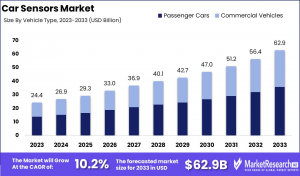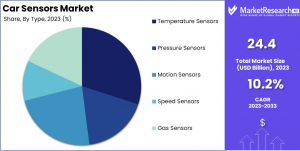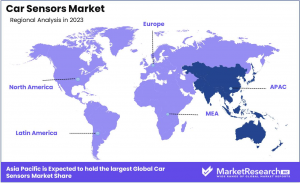Car Sensors Market to Reach USD 62.9 Billion by 2033, Growing at 10.2% CAGR
Global Car Sensors Market to Reach USD 62.9 Billion by 2033, Growing at a CAGR of 10.2% from USD 23.4 Billion in 2023
APAC dominates the car sensors market with 40% share, fueled by automotive growth in China, Japan, and South Korea, and demand for safety and EV technologies.”
NEW YORK, NY, UNITED STATES, February 2, 2025 /EINPresswire.com/ -- Market Overview— Tajammul Pangarkar
The Car Sensors Market1 was valued at USD 23.4 billion in 2023. It is expected to reach USD 62.9 billion by 2033, with a CAGR of 10.2% during the forecast period from 2024 to 2033.
The Car Sensors Market encompasses a wide range of sensors used in vehicles to monitor and manage various functions, including engine performance, safety systems, emissions, and driver assistance. These sensors are critical components in modern vehicles, enabling enhanced safety, efficiency, and compliance with regulatory standards. As automotive technology advances, the demand for sophisticated sensors continues to grow, driven by trends such as electrification, autonomous driving, and connectivity.
The Car Sensors Market is poised for significant growth over the coming years, fueled by increasing vehicle production, technological advancements, and the rising adoption of electric and autonomous vehicles. Governments worldwide are playing a pivotal role in this growth by investing in smart transportation infrastructure and implementing stringent safety and emission regulations.
For instance, mandates for advanced driver-assistance systems (ADAS) and emission control technologies are pushing automakers to integrate more sensors into their vehicles. Additionally, government incentives for electric vehicles (EVs) are accelerating the demand for sensors that monitor battery performance and vehicle efficiency. These factors, combined with the growing focus on road safety and environmental sustainability, are creating a robust ecosystem for the Car Sensors Market to thrive.
The Car Sensors Market presents substantial opportunities for both new entrants and established players. For existing companies, there is potential to expand product portfolios by developing advanced sensors tailored for electric and autonomous vehicles. Collaboration with automakers and technology providers can further enhance market presence.
New players can capitalize on niche segments, such as sensors for aftermarket applications or specialized safety systems. Additionally, the increasing demand for cost-effective and energy-efficient sensors opens avenues for innovation. By leveraging R&D and strategic partnerships, businesses can position themselves to meet the evolving needs of the automotive industry and drive long-term growth in this dynamic market.
Curious About Market Trends? Request Your Complimentary Sample Report Today: https://marketresearch.biz/report/car-sensors-market/request-sample/
Key Takeaway
-- Market Growth: The Car Sensors Market was valued at USD 23.4 billion in 2023. It is expected to reach USD 62.9 billion by 2033, with a CAGR of 10.2% during the forecast period from 2024 to 2033.
--By Type: Temperature Sensors dominated the Car Sensors Market by type.
--By Vehicle Type: Passenger Cars dominated the Car Sensors Market by vehicle type.
--By Application: Powertrain dominated due to enhanced vehicle performance and fuel efficiency.
--Regional Dominance: The Asia Pacific region dominates the global car sensors market with a 40% largest market share.
Use Cases
Advanced Driver Assistance Systems (ADAS): Car sensors, such as radar, LiDAR, and cameras, are integral to ADAS features like lane-keeping assist, adaptive cruise control, and automatic emergency braking. These systems enhance driver safety and reduce accidents.
Engine Management: Sensors like oxygen sensors, temperature sensors, and pressure sensors monitor engine performance, ensuring optimal fuel efficiency, emissions control, and overall vehicle reliability.
Electric and Hybrid Vehicles: Car sensors play a critical role in electric and hybrid vehicles by monitoring battery health, temperature, and charging status. They ensure safe and efficient operation of electric powertrains.
Tire Pressure Monitoring: Tire pressure sensors alert drivers to underinflated or overinflated tires, improving fuel efficiency, tire longevity, and road safety. This feature is now mandatory in many regions.
Autonomous Vehicles: Autonomous cars rely heavily on sensors, including ultrasonic sensors, cameras, and GPS, to navigate and make real-time decisions. These sensors enable self-driving capabilities and ensure passenger safety.
Driving Factors
: Vehicle Safety Standards: Stricter safety regulations worldwide are mandating more sensor systems in vehicles. Advanced driver assistance systems (ADAS) require multiple sensors for features like automatic emergency braking and lane keeping, creating steady demand growth. Car manufacturers must include more sensors to meet new safety requirements and achieve higher safety ratings.
Electric Vehicle Growth: The EV revolution needs specialized sensors for battery management and power systems. These vehicles require unique sensor types for monitoring battery health, thermal management, and regenerative braking systems. As EV adoption increases, the demand for these specialized sensors grows proportionally.
Autonomous Driving Development: Self-driving technology development is pushing sensor innovation and demand. Cars need more sophisticated sensor arrays including LiDAR, radar, and camera systems to enable autonomous features. Even partially autonomous vehicles require extensive sensor networks for safe operation.
Connected Car Features: The rise of connected vehicles requires more environmental and performance sensors. These sensors collect data for predictive maintenance, driver behavior analysis, and vehicle health monitoring. Real-time data transmission needs create demand for more sophisticated sensor networks.
Cost Reduction Technology: Advances in sensor manufacturing are making sophisticated systems more affordable. This cost reduction is enabling wider adoption of sensor-based features across vehicle segments. Mass production techniques are helping bring advanced sensor technology to entry-level vehicles.
Report Segmentation
By Type
• Temperature Sensors
• Pressure Sensors
• Motion Sensors
• Speed Sensors
• Gas Sensors
By Vehicle Type
• Passenger Cars
• Commercial Vehicles
By Application
• Powertrain
• Chassis
• Exhaust
• Security
• Telematics
• ADAS
Ready to Act on Market Opportunities? Buy Your Report Now and Get 30% off: https://marketresearch.biz/purchase-report/?report_id=48178
Regional Analysis
Asia Pacific dominates the global car sensors market with a 40% market share, a reflection of the region's booming automotive industry and rapid advancements in automotive technology. Countries like China, Japan, and South Korea are key players in the automotive sector, with major manufacturers incorporating sensors in vehicles to improve safety, efficiency, and the overall driving experience.
Car sensors are integral for applications such as collision avoidance, parking assistance, adaptive cruise control, and autonomous driving systems. With the increasing adoption of electric vehicles (EVs) and autonomous vehicles (AVs) in the region, the demand for sensors is expected to grow even further.
Additionally, government regulations promoting vehicle safety and environmental sustainability are encouraging the integration of more advanced sensors in cars. Asia Pacific’s large-scale production capacity, coupled with its leadership in automotive innovation, positions the region at the forefront of the car sensors market, with manufacturers continually developing new sensor technologies to meet rising consumer demand for smarter, safer, and more eco-friendly vehicles.
Growth Opportunities
Autonomous Vehicles: The development of autonomous vehicles is driving demand for advanced car sensors, such as LiDAR, radar, and cameras. Companies can focus on developing high-precision sensors that enhance the safety and functionality of autonomous driving systems.
Electric Vehicles (EVs): The rise of electric vehicles presents significant growth opportunities for car sensor manufacturers. Companies can develop sensors specifically designed for EVs, such as battery monitoring sensors and thermal management sensors.
Safety Regulations: Stricter safety regulations are increasing the demand for advanced driver-assistance systems (ADAS) and related sensors. Companies can offer sensors that comply with these regulations and enhance vehicle safety.
Technological Advancements: Investing in advanced sensor technologies, such as MEMS (Micro-Electro-Mechanical Systems) and AI-enabled sensors, can improve performance and reliability. Companies that innovate in this area can differentiate themselves from competitors.
Aftermarket Sales: The aftermarket for car sensors is significant, as sensors need regular replacement and upgrades. Companies can focus on expanding their aftermarket presence through partnerships with auto parts retailers and online platforms.
Key Players
• Robert Bosch GmbH
• DENSO Corporation
• Infineon Technologies AG
• NXP Semiconductor
• ST Microelectronics
• Valeo
• Continental AG
• Sensata Technologies
• Delphi Automotive Company
• Texas Instruments Incorporated
• ELMOS Semiconductor SE
• Other Key Players
Not Sure? Request a Sample Report and See How Our Insights Can Drive Your Business: https://marketresearch.biz/report/car-sensors-market/request-sample/
Conclusion
In conclusion, the markets analyzed are all experiencing growth driven by evolving consumer preferences, technological advancements, and increasing demand for customized, high-quality products. Key trends, such as the adoption of sustainable practices, integration of smart technologies, and rising disposable incomes, are shaping the competitive landscape. While challenges such as market saturation, price sensitivity, and regional differences persist, opportunities abound for companies to capitalize on niche segments, leverage digital platforms, and innovate to meet the specific needs of their target audiences. As these industries continue to expand, businesses that adapt to changing trends, prioritize customer-centric strategies, and invest in innovation will be well-positioned for long-term success.
Related Report
Packaging Foams Market: https://marketresearch.biz/report/packaging-foams-market/
Returnable Packaging Market: https://marketresearch.biz/report/returnable-packaging-market/
Nutraceutical Packaging Market: https://marketresearch.biz/report/nutraceutical-packaging-market/
Bulk Container Packaging Market: https://marketresearch.biz/report/bulk-container-packaging-market/
Polystyrene Packaging Market: https://marketresearch.biz/report/polystyrene-packaging-market/
Paper Packaging Material Market: https://marketresearch.biz/report/paper-packaging-material-market/
Lawrence John
Prudour
+91 91308 55334
Lawrence@prudour.com
1 https://marketresearch.biz/report/car-sensors-market/



